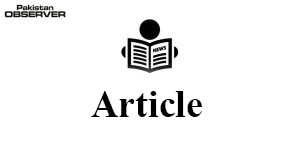Lawfare: Indian tool to prolong illegal rule in IIOJK
The atrocious human rights violations, being committed by the Indian occupation army and law en forcement agencies under these draconian laws, are extremely alarming.
For four decades, these black laws have terrorized the people of Kashmir and subjected them to unthinkable abuse and degradation.
India has instrumentalised the policy of “lawfare” designed to justify military action in IIOJK to crush peaceful freedom movement and supporting state-sponsored terrorism inside Pakistan.
The new media policy enforced by the Indian occupation administration in IIOJK in July last year without any consultations with the media community gave the occupation administration license to gag both print and electronic media.
The policy gave powers to the puppet authorities to distribute government advertisements and determine unilaterally what constitutes false news or incitement against the occupation authorities.
Under the new repressive Media Policy 2020 Indian officers have the power and authority to decide the job of a journalist.
The journalists object that a bureaucrat or a police officer has been empowered now decide what is news and what is not, what is “anti-social and anti-national” news.
They rightly say that the objective of the policy is to strangulate the local media and compel it to build only the government narrative and it has converted journalism into public relations exercise.
The new media policy has added a new gatekeeper – a government official, resulting in the occupation-regulated press.
As per new media policy, advertisements would not be issued or released to any media outlet which in its words incite or intend to incite violence, question sovereignty and integrity of India or violate the accepted norms of public decency and behaviour.
The policy has also empowered the authorities to take punitive action in the form of stopping of government advertisements to the newspapers, prosecuting journalists and editors under various laws of Indian Penal Code.
On the other hand, Kashmiri social media users have been subjected to crackdown to silence dissent.
Cyber police have questioned many Kashmiris for uploading tweets critical of the Indian regime’s policies on Kashmir.
Moreover, the Indian government had been using its influence and clout in social media networking outlets like Twitter, Facebook and Google to get not only removed any post highlighting Indian state terrorism in the IIOJK but also get such accounts suspended for a certain period.
The reason being Indian monopoly over social media sites is that many Indians occupy key posts.
For example, Pichai Sundararajan, known as Sundar Pichai, an Indian-American who is the Chief Executive Officer of Alphabet Inc.,
and its subsidiary Google LLC has been using his offices for protecting Indian government interests at the cost of freedom of expression.
The Indian government has also been exploiting the marketing and commercial interests of social media networks in India for compelling them to budge to Indian tactics.
A Europe-based disinformation watchdog in November 2019 discovered about 265 fake media outlets across 65 countries which promote India’s geopolitical and diplomatic interests through republication of pro-India and anti-Pakistan propaganda pieces and articles.
An investigation by EU DisinfoLab, an NGO tracking sophisticated disinformation campaigns targeting EU countries and institutions, has uncovered links between zombie companies, dormant media outlets and legally non-existent organizations, lobbying the EU and also the UN by constantly targeting Pakistan.
Some of the websites were built in a way meant to influence high-ranking members of the European Parliament.
According to a BBC report the entire enterprise was linked to a single source, an Indian company named Srivastava Group.
Many of these websites, which are also linked to obscure human rights groups, share each other’s content, layering stories in ways that make it difficult for readers to find the source of the information.
Indian side had pushed a one-sided narrative for at least two decades since 9/11 attacks in September 2001 and Pakistan has always adopted a reactive policy against the Indian propaganda to divert world attention from its atrocities in IIOJK and discredit Pakistan in the eyes of the world.
India which has been flouting over a dozen United Nations Security Council resolutions on Kashmir has the audacity and the cheek to blame Pakistan for fomenting unrest in what it calls an integral part of India.
Now time has come that Pakistan should adopt a pro-active and aggressive policy on Kashmir and expose the real face of India by utilizing all political and diplomatic means.
In breach of international law and UN resolutions, India’s unconstitutional and undemocratic actions in IIOJK are creating a serious breach of human rights and Kashmir has become the focus of world attention again.
Pakistan should utilize all political and diplomatic means and adopt new approaches and aggressively highlight the IIOJK humanitarian crisis at all available forums and bilateral engagements with all countries.
Lawfare should be the preferred option for resolution of the long-standing imbroglio because all aspects of the Kashmir dispute are essentially legal propositions.
The territorial dispute involves the interpretation of UN law and bilateral treaties and the Indian and Pakistani constitutions.
Intellectuals including legal experts, academia, think-tanks and universities should jointly build and highlight the legal case of the Kashmir humanitarian crisis on international fora and find new approaches and narratives to deal with the issue.—Concluded










